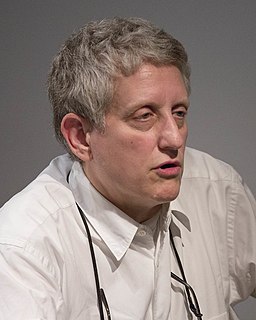A Quote by Taner Edis
Physicists use 'God' as a metaphor more often than other scientists-- especially in popular writing, but in the technical literature as well. Of course, this is just a metaphor for order at the heart of confusion. A rational or aesthetic pattern underlying reality is far from a theistic God.
Related Quotes
People will listen to sophisticated physicists, using God as a kind of metaphor for the deep constants, the deep problems, the deep principles of physics, and say that in that sense I believe in God. The reaction is, "Oh, this great physicist believes in God - that means I'm free to believe in the trinity and in the crucifixion and in the reincarnation of Christ" - and all that stuff, which of course has nothing whatever to do with the fundamental constants of physics, which is what these physicists are talking about.
The facts of nature are what they are, but we can only view them through the spectacles of our mind. Our mind works largely by metaphor and comparison, not always (or often) by relentless logic. When we are caught in conceptual traps, the best exit is often a change in metaphor not because the new guideline will be truer to nature (for neither the old nor the new metaphor lies "out there" in the woods), but because we need a shift to more fruitful perspectives, and metaphor is often the best agent of conceptual transition.
Lakoff's idea is that most of our thought is guided by underlying conceptual mappings between two domains that share some content, that overlap in the sets of their attributes. ... Contrary to the assertions of Lakoff and some of the cognitive metaphor theorists, people can read through to an underlying mapping, but only when the surface metaphor is new to them.
Moreover, metaphor is typically viewed as characteristic of language alone, a matter of words rather than thought or action. For this reason, most people think they can get along perfectly well without metaphor. We have found, on the contrary, that metaphor is pervasive in everyday life, not just in language but in thought and action. Our ordinary conceptual system, in terms of which we both think and act, is fundamentally metaphorical in nature.
In 'Gravity,' nearly everything is a metaphor for the main character. The way I tend to approach a film is that character and background are equally important; one informs the other. Here, Sandra Bullock is caught between Earth and the void of the universe, just floating there in between. We use the debris as a metaphor for adversity.
Why aren't we looking at the causes of breast cancer? Why aren't we spending our energy on looking at what we're doing to the earth? On the pollutants we're putting into the earth? And the pesticides we're putting into the earth? What we're releasing into the air? Instead, we just cut off more organs! That's where metaphor comes into it - not even metaphor as much as reality.
To me there is nothing more sacred than love and laughter, and there is nothing more prayerful than playfulness. When you are in love, all fears disappear, and when you become love yourself, even death becomes irrelevant. Jesus is not very far away from the truth when he says, "God is love." Certainly God is power, the greatest power. I want to improve upon Jesus: I don't say God is love, I say love is God. To me God is only a symbol and love is a reality. God is only a myth - love is the experience of millions of people. God is only a word, but love can become a dance in your heart.
Without metaphor the handling of general concepts such as culture and civilization becomes impossible, and that of disease and disorder is the obvious one for the case in point. Is not crisis itself a concept we owe to Hippocrates? In the social and cultural domain no metaphor is more apt than the pathological one.
"Blessed are the pure in heart, for they shall see God." Can we see God? Of course not. Can we know God? Of course not. If God can be known, He will be God no longer. Knowledge is limitation. But I and my Father are one: I find the reality in my soul. These ideas are expressed in some religions, and in others only hinted. In some they were expatriated. Christ's teachings are now very little understood in this country. If you will excuse me, I will say that they have never been very well understood.
Metaphor isn't just a fancy turn of speech. It shapes our thoughts and feelings, reaches out to grasp new experience, and even binds our five disparate senses. James Geary's fascinating and utterly readable I is an Other brings the news on metaphor from literature and economics, from neuroscience and politics, illuminating topics from consumer behavior to autism spectrum disorders to the evolution of language. As a writer, as a teacher, and as someone just plain fascinated by how our minds work, I've been waiting years for exactly this book.
King in Crimson is actually an alchemical term. King Crimson is a metaphor for Devil or Satan, but at the same time it's also a metaphor for one of the statures in the purification of man and the purification of mankind soul towards union with God and with Infinite, which is the philosophical aim of alchemists.



































